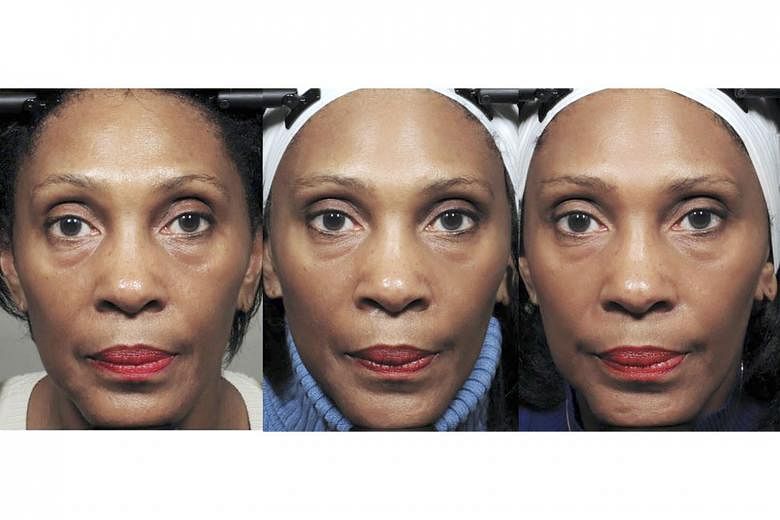Facial exercises may significantly reduce some of the signs of ageing, according to a new study of the effects of repeating specific, expressive movements on people's appearance.
The study, published in Jama Dermatology, found that middle-aged women looked about three years younger after a few months of exercising, perhaps providing a reasonable, new rationale for making faces behind our spouses' backs.
As all of us regrettably know, the human face changes with age.
It begins to accumulate grooves and wrinkles that connote either lengthening years or deepening character, depending on your viewpoint, and starts, almost invariably, to sag.
This sagging occurs in large part because the fat pads that underlie the skin on our faces thin with age.
When we are young, these pads snuggle together like Lego pieces, providing much of the structure of the contours of our faces. But as the pads change with age, their connections loosen and gravity draws them downward, leaving cheeks hollowed and visages generally droopier.
In recent years, a number of facial exercise programmes have become available that claim to be able to reverse many of these visual effects of ageing.
The programmes, often advertised as "non-surgical face-lifts", have generally been developed by self-taught men and women, with only anecdotal evidence showing any beneficial effects.
But they have become popular enough that they recently drew the attention of dermatologists at Northwestern University Feinberg School of Medicine in Chicago.
"We became aware that there were all of these commercial programmes - DVDs, instructional videos, even personal trainers - that purported to be able to help people exercise their faces in ways that would make them be happier, healthier and maybe look younger," said Dr Murad Alam, vice-chairman of dermatology at Northwestern, who led the new study.
"But we were not aware of any scientific proof that these programmes could be effective," he added.
So he and his colleagues decided to test their usefulness.
They began by getting in touch with Mr Gary Sikorski of Providence, Rhode Island, who had developed Happy Face Yoga, one of the longest-established facial exercise programmes. He suggested using a programme of 32 facial exercises that would target most of the muscles in the face and neck.
The basic premise of facial exercising, Mr Sikorski said, is that it provides a kind of resistance training for the facial muscles.
And, as with any type of strength training, it should make those muscles stronger and larger, theoretically filling in spaces hollowed out with age, reducing wrinkling and rounding facial contours.
With that lure, the Northwestern scientists had little difficulty in recruiting 27 women aged 40 to 65 who wanted to try facial exercising. They used only women because this was meant to be a small, pilot study, Dr Alam said, and the fewer additional variables the better.
The women were all photographed and then met Mr Sikorski for two 90-minute, in-person sessions, when he taught them the exercises. Some are elaborate, involving using fingers to provide light resistance while someone smirks, puckers or otherwise manipulates muscles in the cheeks, forehead or neck.
The full session took 30 minutes.
The women were asked to do the exercises every day at home for eight weeks. Then they were photographed again and told to continue with the full routine every other day for another 12 weeks.
Over the course of the 20 weeks, 11 of the participants dropped out, with 16 finishing the programme.
The researchers showed the photographs of these women to dermatologists who did not know them and asked the doctors to rate the appearance of various facial features on a standard numerical scale and also to estimate the women's ages.
They also asked the women how satisfied they felt at the end of the study with the appearance of a number of their facial features.
The women were enthusiastic, finding improvements in almost all of their facial features.
The dermatologists were more circumspect. They noted significant improvements in the fullness of the women's cheeks after 20 weeks but little noticeable change elsewhere on their faces or necks.
But they also estimated the women to be younger after the exercise programme. They ranked the women as, on average, about 51 years old in the photographs at the start of the study but closer to 48 after 20 weeks of facial workouts.
"The improvement was actually greater than I had expected," Dr Alam said.
But this study was obviously small, he said, as well as short term and without a control group. Perhaps most concerning, more than a third of participants quit, suggesting that the exercise programme was onerous.
"It would be good to do follow-up studies to determine which exercises are the most beneficial," Dr Alam said, and then suggest that people concentrate only on those facial gymnastics.
But for now, it is reasonable to consider contorting and pinching up your face if you wish to try to look younger, he said.
"It's a non-toxic, inexpensive and self-administered" therapy, he said.
And he added that "I suspect it would be hard to hurt yourself", unless your ego takes a pounding from any onlookers' snickering.
NYTIMES

